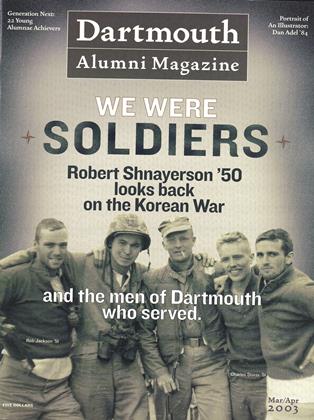“The Courage to be New”
College librarian Richard Lucier injects a dose of high tech into the bibliotheque.
Mar/Apr 2003 Roxanne Khamsi ’02College librarian Richard Lucier injects a dose of high tech into the bibliotheque.
Mar/Apr 2003 Roxanne Khamsi ’02College librarian Richard Lucier injects a dose of high tech into the bibliotheque.
AS THE 17TH HEAD LIBRARIAN IN Dartmouth's history, Richard Lucier oversees 11 campus libraries, 175 staffers, extensive digital sources and more than 2.5 million books. Without question he's the most technology-minded librarian to hit Hanover, having helped found the California Digital Library in 1997. DartmouthAlumni Magazine recently caught up with Lucier to talk about the ways in which the College's libraries—and their users—are evolving with technology.
How is digital technology changingthe way you view your job?
I like to use a line from one of Robert Frosts poems: "The courage to be new." It's really critical that we innovate and try new things and understand that the kind of library we built in the past isn't the only kind of library that's important. What the campus really wants me to do is provide leadership in managing scholarly information, and that takes all sorts of forms. One way is to help develop more and better access to digital materials. Another way is to support scholars on this campus.
What would you say is the best reasonfor going digital?
Every class that comes is more technologically literate than the previous class. People are learning differently these days. And that makes it very important for us to be able to adapt what it is we do to how people learn. Digital really creates the potential of much easier access, and so people can spend their time on working with the content as opposed to spending all day trying to find the material.
And the shortcomings?
Students sometimes think that if it isn't in electronic form, it doesn't exist—and that's not at all true. Here we have far more materials that are non-digital than what's digital. But whether students use those and how many students use those is very different. Also it's much more difficult to judge the quality and integrity of materials in electronic form because you don't really know what you're looking at.
As the library becomes increasinglyWeb-based, what will draw studentsto the building itself?
Libraries are still very important. They create an environment that's very conducive to individual study and also to group work. In fact, Baker-Berry Library is far busier than it ever was. I sometimes take my wireless computer and go downstairs to the Novak Cafe [in the library] to work because there's an energy there I like. The line between work and recreation for students is non-existent.
How would you describe the feel ofBerry Library?
It's very different from the old. I'd say right now that it has the feel of a work in progress. We don't yet understand the character that's going to develop over timethere's just been too much disruption.
What are you reading right now?
Well, I'm actually reading a book by William Mann, a contemporary writer who writes both fiction and thought essays and also historical research; he's primarily a gay writer. He's done some excellent books on Hollywood history. I'm a great fan of Hollywood and musical theater, and I read stuff like that.
Do you own any electronic books?
No, and the library probably doesn't either. Maybe a few. You know libraries don't buy materials like they used to; they license them. The whole business model has changed. Very little of digital material that you get access to here we own. It's all licensed.
Which library most inspires you?
I'd have to say that the library where I most enjoy spending time when I'm doing scholarly work is the New York Public Library. Its just a marvelous cultural institution that serves a very broad, diverse range of society.
What's your favorite library to read in?
Actually, the public library where I live often becomes my favorite library to read in. So my favorite library to read in right now is the Howe [Hanover's public library]. I love going there on an afternoon or evening. It's very homey and pleasant.
We can't let a librarian off the hookwithout asking: Have you ever beenfined for an overdue book?
Yes. I don't remember how much—but I wasn't very good at bringing my books back as a student. And I usually didn't bring them back until I got the overdue notice.
Richard Lucier^
Roxanne Khamsi is a freelance writer living inWashington, D.C.
 View Full Issue
View Full Issue
More From This Issue
-
 Feature
FeatureWomen on the Verge
March | April 2003 By Jennifer Kay ’01 -
 Feature
FeatureWe Were Soldiers
March | April 2003 By CASEY NOGA '00 -
 Cover Story
Cover StoryRemembering America’s Forgotten War
March | April 2003 By ROBERT SHNAYERSON ’50 -
 Feature
FeaturePortrait of an Artist
March | April 2003 By Jake Tapper ’91 -
 Alumni Opinion
Alumni OpinionLoaded Canon
March | April 2003 By Dinesh D’Souza ’83 -
 Article
ArticleSeen & Heard
March | April 2003 By MIKE MAHONEY '92
Roxanne Khamsi ’02
Interviews
-
 Interview
Interview“A Failure to Dig Deeper”
JULY | AUGUST 2020 By ABIGAIL JONES ’03 -
 Interview
InterviewLOOK WHO’S TALKING
MARCH | APRIL 2020 By Betsy Vereckey -
 INTERVIEW
INTERVIEW“A Huge Story”
Sept/Oct 2008 By DAVID MCKAY WILSON -
 Interview
InterviewDartmouth on the Brain: Green Research and Gray Matter
SEPTEMBER 1999 By Karen Endicott -
 Interview
InterviewMany Happy Returns
Nov/Dec 2000 By Robert James Bauer '82 -
 Interview
InterviewLook Who’s Talking
SEPTEMBER | OCTOBER 2020 By Svati Kirsten Narula ’13


